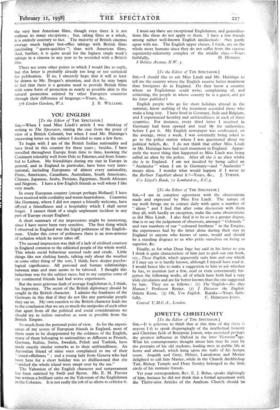YOU ENGLISH
[To the Editor of THE SPECTATOR.] SIR,—When I read Miss Lindt's article I was thinking of writing to The Spectator, stating the case from the point of view of a British Colonial, but when I read Mr. Huizinga's interesting letter on the subject I decided to state a few facts.
To begin with I am of the British Indian nationality and have lived in this country for three years ; besides, I have travelled throughout Europe from time to time, knowing the Continent tolerably well from Oslo to Palermo, and from Istan- bul to Lisbon. My friendships during my stay in Europe in general, and in England in particular, have been very inter- national, including Europeans of almost every nationality, Finns, Americans, Canadians, Australians, South Americans, Chinese, Japanese, Arabs, Persians, Egyptians, North Africans and Negroes. I have a few English friends as well whom I like very much.
In every European country (except perhaps Holland) I have been received with cordiality and warm-heartedness. Countries like Germany, where I did not expect a friendly welcome, have offered a friendliness and a hospitality which I shall -never forget.- I cannot think of a single unpleasant incident in any part of Europe except England.
A short summary of my impressions might be interesting, since I have never been very sensitive. The first thing which I observed in England was the frigid politeness of the English- man. Under this cover of politeness there is an iron-armour of isolation which he never takes off.
The second impression was that of a lack of civilised courtesy in England common to the ediicated people of the whole world. This whole social behaviour seemed rude and crude. Little things like not shaking hands, talking only about the weather or some other thing of the sort, I think, have deeper psycho- logical significance. All personal and human relationships between man and man seems to be tabooed. I thought this behaviour was for the subject races, but to my surprise some of my continental friends had had worse experiences.
But the most grievbus fault of average Englishman is, I think, his hypocrisy. The secret of the British diplomacy should be sought in the British character. I admire the frankness of the Germans in this that if they do not like any particular people they say so. My own reaction to the British character leads me to the conclusion that we are so much the antipodes of each other that apart from all the political and social considerations we should try to isolate ourselves as soon as possible from the British Empire.
So much from the personal point of view. As for the experi- ences of my scores of European friends in England, most of them seem to be disappointed by the coldness of the English, many of them belonging to nationalities as different as French, German, Italian, Swiss, Swedish, Polish and Turkish, have made exactly similar remarks as to their unfriendliness. An Australian friend of mine once complained to me of their " stand-offishness " ; and a young lady from Geneva who had been here for a short holiday was so disillusioned that she " wished the whole island were swept over by the sea."
The Yahooism of the English character and temperament has been satirised by Swift and Byron. Mr. E. M. Forster has written a brilliant satire on the Yahooism of the Englishmen in the Colonies. It is not really the job of us aliens to criticise it. I must say-there are 'exceptional Englishmen, and generalisa- tions like these do not apply to them. I have a few friends among rather well-known English intellectuals : they partly agree with me. The English upper classes, I trunk, are on the whole more humane since they do not suffer from the-curious superiority-inferiority complex of the middle class.—Yours


















































 Previous page
Previous page